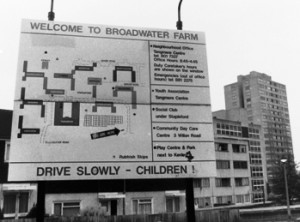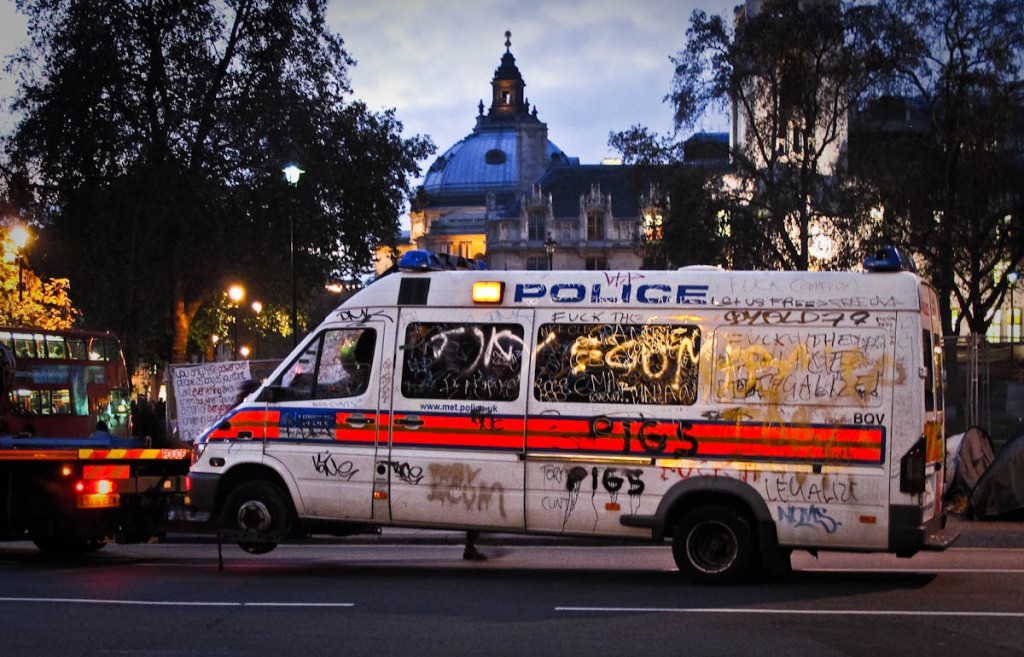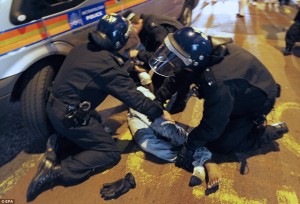The Anti-Imperialist The UK Riots: Redefining the Political
New in Ceasefire, The Anti-Imperialist - Posted on Sunday, September 11, 2011 10:00 - 11 Comments
By Adam Elliott-Cooper
On Thursday 4th August 2011, a man was killed by police. As a Black man, this death must be contextualised among the disproportionate number of Black deaths in police custody and the institutional racism of the police force proven in the McPherson Report. The death of the victim in question, Mark Duggan, was therefore treated as a political as well as legal and moral injustice. By Saturday 6th August, Mark’s family had still not offered any answers or explanations from the police, and therefore exercised their democratic right to hold a peaceful protest outside the police station, until the murder of Mark was addressed, as is procedure for the family of a murder victim. The family and friends of Mark Duggan were ignored, but more members of the community, learning of the actions of local police, joined the peaceful protest to (rightly) demand answers to some very serious questions.
The IPCC responded: “’I am aware of various media reports suggesting that we have not had adequate contact with Mr Duggan’s family since his death. Following my meeting with the family yesterday (Sunday) I am very clear that their concerns were not about lack of contact or support from the IPCC. Their concerns were about lack of contact from the police in delivering news of his death to Mark’s parents. It is never the responsibility of the IPCC to deliver a message regarding someone’s death and I have told Mr Duggan’s family that I would be addressing this issue with the Met and that, if necessary, this would become part of our investigation … I am also aware that Mr Duggan’s family were unhappy at waiting at the police station for such a long time. The IPCC was contacted by the MPS at 8.30 pm on Saturday evening. We were told that Mr Duggan’s partner had been there and wanted answers to a variety of questions, but that she had now left.”
Police officers eventually addressed the protesters, trying to shepherd them away from the Police Station entrance. By this point, the crowd had grown frustrated, and many began shouting at the officers. It was at this point that an officer lashed out and struck a 16 year old female protester. The sequence of events leading up to this incident was a final straw which led to young people in the crowd abandoning the demonstration outside the station, and instead turned their frustration onto the police vehicles in the surrounding area.
Police stations, vehicles and officers became the target of young people’s frustrations in a number of different regions of London, before rapidly spreading to other parts of the country. As word spread of a violent insurrection against the agents of the state, young people in Clapham charged at riot police with sticks and bottles, while gangs in Nottingham put aside their differences to petrol bomb four Nottinghamshire Police Stations. Condemning this violence on moral grounds does not make the acts of these young people any less political.
Progressive MPs, thinktanks, lawyers and academics had long been campaigning against police powers. Stop and search had increased by over 300% in the last ten years for African and Caribbean males, over 200% for Asian males and over 100% for White males. These much-cited statistics reflect the multicultural nature of what became the riots, but also explains the genesis in the Black communities of Tottenham.
But Black communities in Tottenham are not simply made up of a mass of marginalised youths as much of the media indicates. Members of various communities, both those affected and those sympathetic are coming together to defend a generation of young people from being criminalised by the state. David Cameron has been emphatic in his hardline approach to the young people involved, with more stops, more raids, more arrests and harsh custodial sentences for minor crimes. This is of course peppered with the authoritarian populism arising in making the poorest young people and their families (those in council homes), effectively homeless.
Sympathetic lawyers have been providing legal training in the hardest hit areas of North London, with volunteers on every estate offering those targeted by police with legal advice, representation and support. Professional analysts have disregarded the riots and the response as lacking political vision, however the immediate needs of the community and its young people is to protect it from falling victim to the full force of state power. Not only does this form of organising keep young people free from incarceration and criminalisation, but it also builds knowledge, networks and mutual understanding between generations and among communities.
It is highly significant, that amidst the trauma of losing a close relative, the Duggan family have still contextualised the killing of Mark in a straight forward, but important way. Highlighting the clear shoot-to-kill policy which led to the killing transforms the argument from a moral tragedy to a political strategy to be challenged. Responding to the fury in the press on the emergence of an alleged ‘gang culture’ in Britain, Mark Duggan’s brother said “We’ve heard everyone talking about gangs but the police are the biggest gang of all, an institutionalised gang”.
There can be little doubt that this gang is being used by the state to control and repress, not maintain stability and or uphold justice. A young person who stole a bottle of water has been given over a year in prison, not because that young person broke a law, but because that person was part of a violent movement which seriously challenged a state machine which racialises, impoverishes and dehumanises their communities.
Recognising the politics in these actions has escaped many professionals, however the young people affected by the uprising have far less trouble in seeing through the propaganda of the press and politicians, offering their own analysis of the political. Youth groups led by young people have been collecting young people’s responses to the riots. Conversations with peers have developed into an understanding for a need to record and collate these needs and opinions in order to democratise local politics.
***
***
Working with large numbers of young people from North London, they have recorded their feelings on unemployment, the cuts to EMA and youth services, police powers, media and political corruption, poverty and racism. Some answers invariably regurgitated the standard line forced onto the public by the media and parliament on greed and poor parenting. However overwhelmingly, young people adopt a far more nuanced approach.
Many young people wrote that cuts to education, training and employment opportunities played a big part in spurring on rioters. They did not need academics to tell them there are over 30 unemployed people for every vacancy in Haringey at the moment, or the psychological effects of tuition fees tripling to £9000 for university students.
In response to the harsh sentencing of rioters, one 17 year old observed the theft in the form of expenses by MPs, or the money gleaned by the bankers who remain unpunished for taking money which, as he believed, was stolen from the taxpayer. Most interesting however, was a question which every young person responded to in a similar manner. They were asked whether a mass movement was needed, in order to address the issues leading to the riots, which engaged with centres of power in a variety of ways, decided by the affected communities. The responses were consistently positive.
The reactionary nature of the state following these riots does not show its crushing power, but a fear of its precarious grasp on power being so quickly resisted by those for whom their version of democracy, fails to function.
Adam Elliott-Cooper, a writer and activist, is Associate Editor of Ceasefire. His column on race politics appears twice a month.
He can be followed on Twitter @adamec87
11 Comments
Danny
adam
The quest was carried out in 1999 by the Mcpherson Report as the article clearly stipulates in the opening paragraph.
Black people are overrepresented in deaths in custody in the UK – meaning that although white people do die in custody, far more Black people, as a proportion of the population, die in custody.
Danny
The McPherson report is over a decade old and it has been widely accepted (perhaps most prominently by Trevor Phillips) that the police, specifically the Met, have made huge strides in combating racism. Lots of statics and measures support this.
Deaths in police custody have specifically fallen dramatically (59 in 1990 and 15 in 2010). Why do you not mention statistics like these and only ones which suit your arguments?
I’ve seen more journalistic balance in watching Fox News then in this article.
Danny
Indeed the statistics source you quoted in the article on black deaths in police custody, in relevance to the 2011 Riots, hasn’t been updated since 2004 and so is 7 years out of date. (http://www.irr.org.uk/2002/november/ak000006.html)
Is this journalistic carelessness or deliberate manipulation of statistics?
Danny
The same can be said for your Stop and Search statistical source which uses data which is almost 4 years old, and acknowledges itself that the year saw a sharpe spike and thus could be an anomaly.
adam
Selective with my statistics? OK, well how about citing the fact that stops and searches of African Caribbeans have increased by over 300% in the past 10 years and over 200% for Asians. How about the fact that nearly 2/3s of African Caribbean men in London are on the polices DNA database, whether they have been found guilty of an offense or not.
Widely accepted? Now that’s the kind of sweeping statement I’d expect from Fox News. Trevor Philips is completely alone in thinking that institutional racism has been tackled. When you say ‘widely accepted’, what you actually mean is, the government, (http://www.guardian.co.uk/politics/2009/feb/23/michael-white-institutional-racism?INTCMP=SRCH and http://www.guardian.co.uk/politics/2003/jan/14/immigrationpolicy.race?INTCMP=SRCH) the police, Trevor Phillips and the right wing press. A
If I am being selective with my stats and analysis, then so is the entire race equality sector:
Runnymede: http://www.runnymedetrust.org/uploads/publications/pdfs/StephenLawrenceInquiry-2009.pdf
Race on the Agenda: http://www.rota.org.uk/Downloads/TJPPCReport.pdf
Stop Watch: http://www.stop-watch.org/uploads/articles_research_docs/modern%20law%20review.pdf
Sir Bill Morris: http://www.guardian.co.uk/uk/2004/dec/15/race.ukcrime1
The Laurence Family: http://www.guardian.co.uk/uk/2009/feb/21/doreen-lawrence-police-racism
Gary Younge: http://www.guardian.co.uk/commentisfree/2009/dec/28/goodbye-noughties-race-relations
If you want more, please take the time to carry out a simple google search
Bobby
“the police, specifically the Met, have made huge strides in combating racism.”
What an outrageous lie. The police and ‘combating racism’ is an oxymoron – especially the Met. You don’t even need a report to tell you that, just go out on the streets of London.
Thanks for the article Adam, spot on.
Danny
Once again Adam, you cite sources none of which are any later than 2009, and some date back to 2003 and are thus out of date by 8 years. Why do you continue to do this? I ask again is it journalistic carelessness or deliberate manipulation of statistics?
You cite one of my comments as a “sweeping statement” and then in the next breath say “Trevor Philips is completely alone in thinking that institutional racism has been tackled.” Do you not see the irony in your comment?
No one is claiming police racism has completely gone away. However I repeat the police have made strides in tackling it. Forgive me Bobby but I won’t take your suggestion of just “going out on the streets of London” as proof this hasn’t happened.
Since you appear fixated on deaths in custody, I will provide you with some data as you appear to be unable or more likely unwilling to use it. Last year in 2010 one black and minority ethnic (BAME) person died in custody. In 1999 the year of the McPherson eight died.
adam
OK Danny
Here is a report citing institutional racism which was published just 3 months ago. It was written by a coalition of 17 race equality organisations including Runnymede, and was submitted to the United Nations: http://www.runnymedetrust.org/uploads/pdfs/UK%20NGOs%20Against%20Racism%20CERD%20Report.pdf
I stand by the comment that Trevor Phillips is alone in the race equality sector in playing down the impact of institutional racism – I am still waiting for you to present evidence to the contrary (I provided 6 examples in my previous post).
I am not fixated on deaths in custody. That is why I have presented evidence on stop and search and the DNA database. Through my work with a number of race equality organisations, and as a researcher at the Greater London Authority, I am fully aware (as you probably are), that the Met work very hard to keep the data on ethnicity and stop-and-search internal for as long a time as possible, which is why neither you or I have presented recent stats on race and stop and search. However, as Bobby remarked, and as I can confirm, independent research (such as that refered to in the article), and personal experience (something for which I am assuming you cannot relate), suggest that little has changed in the past 10 years in relation to the Black experience of police powers.
UMMAH NEWS » » An A to Z of Theory | Alain Badiou: The Event
[…] part will remain quiet. This part might erupt into the situation at any time. One can think here of the mass revolt of 2011, for instance, or the Arab Spring, or the Caracazo. Such events may appear to have been […]
The Event: Revolutionary Explosion of the Excluded [Shunyata] | Engage!
[…] will remain quiet. This part might erupt into the situation at any time. One can think here of the mass revolt of 2011, for instance, or the Arab Spring, or the Caracazo. Such events may appear to have been foreclosed […]




Prior to Duggan, in the last three years there have been seven fatal police shootings and all of those were of white people. Strange you fail to mention that Adam in your quest to paint the police as institutionally racist.